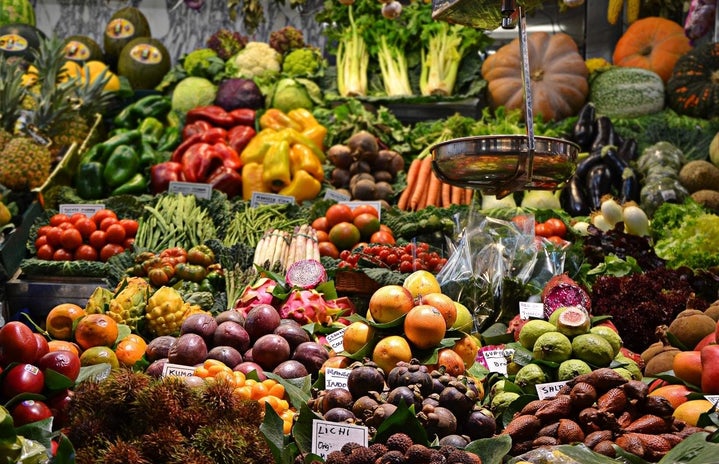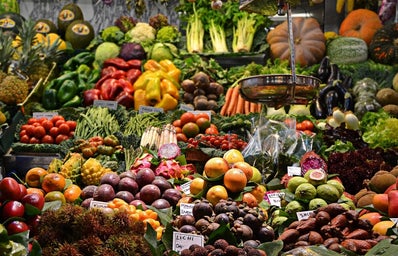I know what you’re thinking — why bother with buying produce in season, especially when grocery stores make everything so readily available to us? While that convenience may be tempting, the benefits of buying produce that’s in season may convince you to adopt a new lifestyle when it comes to making your grocery lists!
So what does buying produce “in season” even mean? It means you’re buying the fruits and vegetables that naturally grow during that season. A lot of the time, we’re buying produce during times when it’s not even meant to be available to us. The demand for produce that isn’t in season can be so high, which results in our grocery stores trying to fulfill these demands by either getting farmers to use chemicals to manipulate their crops and make the produce grow at a faster rate, or results in having to import fruit from other countries where that produce is in season.
This produce is at its peak, meaning it’s delicious. On top of the deliciousness that comes with this peak season produce, they do a ton of favors for your skin and body, the environment (love ya, Mother Earth), and give you a chance to get super creative with your meals.
- It’s a great way to support local farming.
-
Buying produce in season takes full advantage of local crops, and supporting local businesses and farmers is a great way to contribute to your community. In doing so, we become part of a larger narrative that values and takes advantage of everybody’s place within and contributions to the community.
While buying produce in season doesn’t always mean that it’s local, encouraging and supporting the consumption of produce that’s in season let’s farmers and national grocery chains know what’s in demand, which can hopefully put an end to importing produce that isn’t meant to be sold outside peak timing.
- It helps you adopt a sustainable lifestyle.
-
Let’s be reminded that our food choices have impacts on the environment and the communities surrounding us. Think about how many chemicals go into producing and packaging a basket of strawberries in the middle of the winter, when you could replace that with so many other options.
When we pass on produce that’s in season in favor of other fruits or veggies, we support the addition of chemicals, toxins, and preservatives to our environment and food. The Environmental Working Group (EWG) and their Department of Agriculture discovered that approximately 70 percent of US produce has pesticide residue while creating their 2019 Shopper’s Guide to Pesticides in Produce. Additionally, when we don’t buy produce that’s in season, the fuel that’s used to import the out of season produce people are craving has a serious negative impact on the environment.
Being mindful of what we are eating helps to protect the environment, because we fully understand what we can give and take from the planet without harming it.
- It’s healthier and safer.
-
Buying produce in season is healthier because when your favorite fruits and veggies aren’t in season, they’re either being preserved with chemicals, or come into contact with toxins to taste better during a season that they aren’t so used to.
As I mentioned earlier, when you buy produce in season, there are less pesticides and other chemicals and unnatural toxins in your produce, which would typically be used to preserve them out of season. These toxins and chemicals have potential to impact your body in the long run. For example, after testing over 92 kale samples, the United States Department of Agriculture (USDA) discovered that kale is actually one of the most contaminated types of produce, with 60% of the samples containing Dacthal, a pesticide that has been linked to cancer since 1995. If there are continents banning certain pesticides, what makes it OK for them to be in our kale smoothies and salads?
The “Dirty Dozen” guide to the most pesticide-contaminated produce of 2019, and the “Clean Fifteen” guide to the least pesticide-contaminated produce of 2019 are just two examples as to how organizations such as the EWG work hard to make information about produce accessible when it comes to understanding the chemicals and toxins that are in our food.
- You can get more creative with recipes.
-
A lot of the times, we crave those Insta-worthy dishes, but rarely do we think about whether or not the produce ingredients are in season. And usually, the out-of-season produce has been manipulated to the point where the fruits and veggies look so perfect — in color, shape and size. Something worth thinking about in regard to the aesthetic of our produce is that it doesn’t have to look perfect to be perfect. Causes like Ugly Produce is Beautiful by Sarah Phillips call attention to the fact that the food industry is so willing to throw out food that is perfectly good, simply because they don’t meet appearance standards.
Consuming produce that’s in season encourages us to be mindful of not only our purchases but also how we use the produce. Most produce that’s in season, if it hasn’t come into contact with too many pesticides, may look a little different from those that haven’t been as manipulated, and that’s OK! Don’t judge a book by its cover and feel free to use this as an opportunity to get creative with your meals.
While some may think buying produce that’s in season means you have to limit yourself and the variety of produce to choose from, challenge yourself to get more creative with these “limitations.” Instead, look at buying produce in season as a way to get more creative with your recipes. Think of all the different combinations of fall and winter soups, and spring and summer salads (all the pretty Instagram-story worthy dishes).
- The list is already made for you.
-
Not convinced yet? If you’re interested finding out what is specifically in season throughout the different points of the year, check out this list created by experts from the Food Network Canada, or if you’re in the U.S., check out Seasonal Food Guide for a detailed state-specific breakdown. Don’t hesitate to Google search what’s in season where you live.
Now that you’ve found your new wellness goal, don’t be afraid to grocery shop until you drop, and start buying produce that’s in season. Making conscious decisions about the food we consume does a lot for our communities, our environment, our bodies, and food creativity. Buying produce out of season is just that — it’s so out of season.



